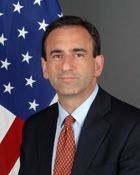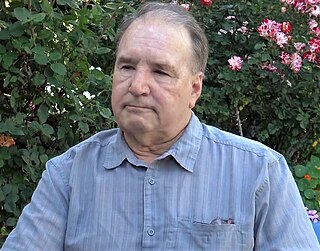
The Brookings Institution, often stylized as Brookings, is an American think tank that conducts research and education in the social sciences, primarily in economics, metropolitan policy, governance, foreign policy, global economy, and economic development.

Bill Clinton's tenure as the 42nd president of the United States began with his first inauguration on January 20, 1993, and ended on January 20, 2001. Clinton, a Democrat from Arkansas, took office following his victory over Republican incumbent president George H. W. Bush and independent businessman Ross Perot in the 1992 presidential election. Four years later, in the 1996 presidential election, he defeated Republican nominee Bob Dole and Perot again, to win re-election. Clinton was limited to two terms and was succeeded by Republican George W. Bush, who won the 2000 presidential election.
Michael Mandelbaum is a professor and director of the American Foreign Policy program at the Johns Hopkins University, School of Advanced International Studies. He has written a number of books on American foreign policy and edited a dozen more.

Russia and the United States maintain one of the most important, critical and strategic foreign relations in the world. Both nations have shared interests in nuclear safety and security, nonproliferation, counterterrorism, and space exploration. Due to the Russian invasion of Ukraine, relations became very tense after the United States imposed sanctions against Russia. Russia placed the United States on a list of "unfriendly countries", along with Taiwan, South Korea, Japan, Singapore, European Union members, NATO members, Australia, New Zealand, Switzerland, Micronesia, and Ukraine.
The foreign policy of the Bill Clinton administration was of secondary concern to a president fixed on domestic policy. He relied chiefly on his two experienced Secretaries of State Warren Christopher (1993–1997) and Madeleine Albright (1997–2001), as well as Vice President Al Gore. The Cold War had ended and the Dissolution of the Soviet Union had taken place under his predecessor President George H. W. Bush, whom Clinton criticized for being too preoccupied with foreign affairs. The United States was the only remaining superpower, with a military strength far overshadowing the rest of the world. There were tensions with countries such as Iran and North Korea, but no visible threats. Clinton's main priority was always domestic affairs, especially economics. Foreign-policy was chiefly of interest to him in terms of promoting American trade. His administration signed more than 300 bilateral trade agreements. His emergencies had to do with humanitarian crises which raised the issue of American or NATO or United Nations interventions to protect civilians, or armed humanitarian intervention, as the result of civil war, state collapse, or oppressive governments.

The International Center for Research on Women (ICRW) is a non-profit organization with offices in Washington, D.C., United States, New Delhi, Ranchi, and Jamtara, India, Nairobi, Kenya, and Kampala, Uganda. ICRW works to promote gender equity, inclusion and shared prosperity within the field of international development.

Ivo H. Daalder, is President of the Chicago Council on Global Affairs and has served since July, 2013. He was the U.S. Permanent Representative on the Council of the North Atlantic Treaty Organization (NATO) from May 2009 to July 2013. He was a member of the staff of United States National Security Council (NSC) during the administration of President Bill Clinton, and was one of the foreign policy advisers to President Barack Obama during his 2008 presidential campaign.

Diplomatic relations between Denmark and the United States of America began in 1783. Both countries are members of the Arctic Council, OECD, OSCE, NATO and the United Nations.

Thomas Edward Donilon is an American lawyer, business executive, and former government official who served as the 22nd National Security Advisor in the Obama administration from 2010 to 2013. Donilon also worked in the Carter and Clinton administrations, including as chief of staff of the U.S. State Department. He is now Chairman of the BlackRock Investment Institute, the firm's global think tank.

The term Obama Doctrine is frequently used to describe the principles of US foreign policy under the Obama administration (2009–2017). He relied chiefly on his two highly experienced Secretaries of State—Hillary Clinton (2009–2013) and John Kerry (2013–2017)—and Vice President Joe Biden. Main themes include a reliance on negotiation and collaboration rather than confrontation or unilateralism.

Philip H. Gordon is an American diplomat and foreign policy professional. Since March 21, 2022, he has served as Assistant to the President and National Security Advisor to the Vice President of the United States, Kamala Harris. Earlier in his career, he was Assistant Secretary of State for European and Eurasian Affairs (2009–2011) and Special Assistant to the President and White House Coordinator for the Middle East, North Africa, and the Persian Gulf Region (2013–2015) during the presidency of Barack Obama.
U.S. President Barack Obama's East Asia Strategy (2009–2017), also known as the Pivot to Asia, represented a significant shift in the foreign policy of the United States since the 2010s. It shifted the country's focus away from the Middle Eastern and European sphere and allowed it to invest heavily and build relationships in East Asian and Southeast Asian countries, especially countries which are in close proximity to the People's Republic of China (PRC) either economically, geographically or politically to counter its rise as a rival superpower.
For purposes of U.S. foreign policy, Europe consists of the European Union and non-EU states in Europe.

William John Antholis is a Greek-American political scientist. He is director and CEO of the Miller Center of Public Affairs, a nonpartisan affiliate of the University of Virginia that specializes in presidential scholarship, public policy, and political history and strives to apply the lessons of history to the nation's most pressing contemporary governance challenges. Prior to that, Antholis served as managing director of the Brookings Institution, a Washington think tank. He currently serves as a non-resident senior fellow at Brookings. His research interests include subnational governance and federalism, energy policy, bottom-up efforts and international negotiations around climate change, the role of democracy, and community development.

Jacob Jeremiah Sullivan is an American attorney who currently serves as the United States National Security Advisor, reporting directly to President Joe Biden. He previously served as Director of Policy to President Barack Obama, National Security Advisor to then Vice President Biden and Deputy Chief of Staff to Secretary Hillary Clinton at the U.S. Department of State. Sullivan also served as senior advisor to the U.S. federal government at the Iran nuclear negotiations and senior policy advisor to Clinton's 2016 presidential campaign, as well as visiting professor at Yale Law School.

Derek Shearer is an American former diplomat who served as the United States Ambassador to Finland. He is currently employed by Occidental College, directing the McKinnon Center for Global Affairs and serving as a Chevalier Professor of Diplomacy and World Affairs.
Brooke Lloyd Shearer was an American private investigator, journalist, employee of the U.S. Department of the Interior, aide to Hillary Clinton, and wife of long-time Brookings Institution president Strobe Talbott.

Derek Chollet is an American foreign policy advisor and author currently serving as the counselor of the United States Department of State. Previously, Chollet was the executive vice president for security and defense policy at the German Marshall Fund of the United States. From 2012 to 2015, Chollet was Assistant Secretary of Defense for International Security Affairs, where he managed U.S. defense policy involving Europe, NATO, the Middle East, Africa, and the Western Hemisphere for Secretaries of Defense Leon Panetta and Chuck Hagel.

The Foreign Affairs Policy Board is an advisory board that provides independent advice and opinion to the Secretary of State, the Deputy Secretary of State, and the Director of Policy Planning on matters concerning U.S. foreign policy. The Board reviews and assesses global threats and opportunities, trends that implicate core national security interests, tools and capacities of the civilian foreign affairs agencies, and priorities and strategic frameworks for U.S. foreign policy. The Board meets in a plenary session several times a year at the U.S. Department of State in the Harry S. Truman Building.
This bibliography of Bill Clinton is a selected list of generally available published works about Bill Clinton, the 42nd president of the United States. Further reading is available on Bill Clinton, his presidency and his foreign policy, as well as in the footnotes in those articles.


















